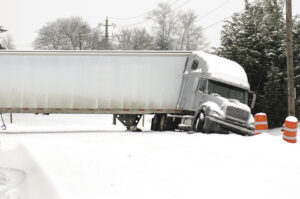What Damages Can I Recover After a Jackknife Truck Accident?
After a jackknife truck accident in Florida, you may pursue compensation for a wide range of losses. This includes all of your current and future medical bills, lost income from being unable to work, the cost to repair or replace your vehicle, and the significant physical and emotional pain the collision has caused.
The process of recovering these damages is not straightforward. Trucking companies and their insurers have teams that begin investigating immediately, and their business interests require them to manage claim payouts carefully, so working with a Tampa truck accident lawyer can help protect your rights and strengthen your claim.
The key to securing a fair recovery is to systematically identify and document every single loss, including both financial and personal. This creates a comprehensive and evidence-backed claim that reflects the true impact the accident has had on your life.
If you have a question about what your jackknife accident claim might be worth, call us for a free consultation at (813) 445-8161.
Table of Contents
ToggleThe Three Buckets of Compensation in a Truck Accident Claim
 After a serious crash, you are faced with a flood of expenses and losses, and it’s difficult to know what to claim. It is common for people to focus only on the immediate bills. They might overlook future medical needs or the profound, non-financial ways the injury has changed their life, which could leave them under-compensated years from now, which is why you should hire a truck accident attorney to make sure every loss is fully documented and pursued.
After a serious crash, you are faced with a flood of expenses and losses, and it’s difficult to know what to claim. It is common for people to focus only on the immediate bills. They might overlook future medical needs or the profound, non-financial ways the injury has changed their life, which could leave them under-compensated years from now, which is why you should hire a truck accident attorney to make sure every loss is fully documented and pursued.
Florida law organizes damages into three distinct categories to ensure every loss is accounted for.
What Are Economic Damages?
These are your measurable, out-of-pocket financial losses. Think of them as the concrete receipts, invoices, and financial records connected to the accident.
- All Medical-Related Expenses: This covers everything from the initial ambulance ride and emergency room visit to any future surgeries, ongoing physical therapy, prescription medications, necessary medical devices, and in-home nursing care. With rising medical costs, projecting these future needs is a key part of your claim.
- Lost Wages and Future Earning Capacity: This includes the paychecks you have already missed while recovering. More importantly, it also accounts for the income you will not be able to earn in the future if your injuries prevent you from returning to your job or working at the same capacity.
- Property Damage: This is the cost to either repair your vehicle or, if it was declared a total loss, its fair market replacement value. It also includes any other personal items damaged in the crash, such as a laptop or phone.
What Are Non-Economic Damages?
This is compensation for the intangible, human cost of the accident. There is no receipt for this kind of harm, but it is just as real.
- Pain and Suffering: Compensation for the physical pain, discomfort, and limitations caused by your injuries.
- Emotional Distress and Mental Anguish: This includes anxiety, depression, insomnia, or post-traumatic stress disorder (PTSD) stemming from the traumatic event.
- Loss of Enjoyment of Life: This addresses your diminished ability to participate in hobbies, activities, and family events that you once valued.
- Loss of Consortium: If your injuries have negatively affected your relationship with your spouse, they may have a claim for the loss of companionship and support.
When Might Punitive Damages Apply?
This third category is different. Punitive damages are not meant to compensate you for a loss. Instead, they are awarded in rare cases to punish a defendant for particularly reckless or intentional misconduct and to deter other companies from acting the same way, and you need a truck accident lawyer to evaluate if your case qualifies for this type of compensation.
Some examples might include:
- A trucking company knowingly falsified its maintenance logs to keep an unsafe truck on the road.
- The company hired a driver with a known history of substance abuse and failed to conduct required testing.
- A driver intentionally violated federal hours-of-service rules and caused a crash due to extreme fatigue.
How Do We Prove the Full Value of Your Claim?
After a crash, sending the insurance company a list of your losses is not enough to secure a fair payment. They require detailed, organized proof for every single dollar you are claiming. You are responsible for providing that proof.
The Paper Trail: Documenting Your Economic Damages
This is about building an undeniable record of your financial losses.
- Gathering Medical Evidence: We collect every bill and record, from the initial paramedic report to the detailed notes from your physical therapist.
- Calculating Lost Income: We use your pay stubs, employment records, and tax returns to prove the income you have lost.
- Projecting Future Losses: For serious injuries, we work with outside professionals, such as life care planners and economists. They analyze your medical needs and career path to create an expert report that calculates the cost of your future medical care and your diminished earning capacity over your lifetime.
Telling Your Story: Your Non-Economic Damages
- A Personal Injury Journal: We advise clients to keep a simple daily journal. This document tracks your pain levels, your physical limitations, and the specific ways the injury impacts your daily life. It becomes a powerful, firsthand account of your suffering.
- Statements from Friends and Family: Testimony from people who know you best paints a vivid picture for an insurance adjuster or a jury of how your personality, abilities, and relationships have changed since the accident.
Why Jackknife Accidents Typically Involve Such Significant Damages
You have probably heard that settlements and verdicts in commercial truck accident cases are typically much higher than in typical car crashes. This is rooted in specific factors unique to the trucking industry, and can a truck accident lawyer help you understand these factors and build a strong claim for full compensation.
The Sheer Physics of a Jackknife Crash
A fully loaded semi-truck weighs up to 80,000 pounds. When it goes out of control in a jackknife, the force is devastating and frequently causes catastrophic injuries like traumatic brain injuries (TBIs), spinal cord damage, and permanent disabilities.
These severe injuries require a lifetime of medical care, driving the value of both economic and non-economic damages significantly higher.
Uncovering Violations of Federal Trucking Regulations
The Federal Motor Carrier Safety Administration (FMCSA) sets strict safety rules for the entire trucking industry. A violation of these rules is powerful evidence of negligence.
Technology-Driven Evidence: We use data from the truck’s own systems to find violations:
- Electronic Logging Devices (ELDs): This data shows if the driver violated hours-of-service rules designed to prevent driver fatigue.
- Dashcams and Telematics: This footage and data provide a clear picture of what happened in the moments before the crash.
The Power of Negligence Per Se: This is a legal concept that means if we prove the trucking company violated a safety regulation, they are considered automatically negligent. This removes the need to argue about whether their conduct was reasonable or if the violation itself establishes their fault.
Identifying All Responsible Parties
In a jackknife accident, the fault may lie with more than just the driver. Our investigation looks at the entire chain of responsibility, which could include:
- The Trucking Company: For negligent hiring, poor training, or pressuring drivers to violate safety rules. This falls under a legal doctrine called Respondeat Superior, which holds employers responsible for their employees’ actions.
- A Maintenance Contractor: If they performed faulty repairs on the truck’s brakes or tires.
- The Cargo Shipper: If they improperly loaded the trailer, causing it to become unstable.
When Partial Fault Limits Your Damage Recovery Under Florida Law
Florida law uses a comparative fault system. This means your final compensation is reduced by whatever percentage of fault is assigned to you. For example, if you are found 10% responsible, your total damage award is reduced by 10%. However, if you are found to be more than 50% at fault, you cannot recover damages.
Insurance companies conduct a thorough investigation, looking for any evidence to argue you were partially at fault. Our job is to build a strong counter-narrative using evidence from accident reconstructionists, witness interviews, and vehicle data to ensure no amount of blame is unjustly placed on you.
Understanding Commercial Trucking Insurance Coverage: The Financial Reality Behind Your Recovery
 The amount of money available for your jackknife truck accident damages depends heavily on the insurance coverage structures and corporate relationships that govern the trucking industry, and truck driver fatigue often plays a major role in these crashes by increasing both the severity of injuries and the complexity of insurance claims.
The amount of money available for your jackknife truck accident damages depends heavily on the insurance coverage structures and corporate relationships that govern the trucking industry, and truck driver fatigue often plays a major role in these crashes by increasing both the severity of injuries and the complexity of insurance claims.
These financial arrangements determine whether your case has access to hundreds of thousands or millions of dollars in coverage, making the difference between partial compensation and full recovery for catastrophic injuries.
Most accident victims assume that all trucking companies carry similar insurance coverage, but the reality involves layered policies, corporate structures, and business relationships that create vastly different coverage scenarios depending on the specific companies involved in your accident.
Federal Coverage Requirements vs. Real-World Insurance Limits
The Federal Motor Carrier Safety Administration requires different minimum insurance coverage amounts based on the type of cargo and transport operation, but these minimums often fall far short of what serious jackknife accidents actually cost victims.
Most established trucking companies carry significantly higher insurance limits because they understand the catastrophic damage potential of jackknife accidents involving 80,000-pound vehicles.
Companies operating large fleets often maintain $10 million to $50 million in total coverage through layered insurance programs that stack multiple policies to create substantial protection. These higher coverage amounts exist because trucking industry experience shows that serious accidents regularly generate claims exceeding federal minimums by substantial margins.
Primary, Excess, and Umbrella Coverage Coordination
Commercial trucking insurance operates through multiple policy layers that activate in sequence when claims exceed lower-level coverage limits. Primary liability insurance provides the first layer of protection, typically ranging from $1 million to $10 million depending on the carrier’s size and risk profile. Once primary coverage limits are exhausted, excess insurance policies provide additional protection in predetermined amounts that could extend total coverage to $50 million or higher.
Umbrella policies offer another layer of protection that works differently from excess coverage by filling gaps between different types of liability policies and providing broader coverage than the underlying insurance. These policies become particularly important in jackknife cases because they often cover situations that might be excluded from primary or excess policies, such as certain types of cargo-related liability or environmental damage claims.
Owner-Operator vs. Company Driver Insurance Implications
The employment relationship between drivers and trucking companies significantly affects the insurance coverage available for your damages. Company-employed drivers operate under their employer’s commercial insurance policies, which typically provide substantial coverage amounts and include the full corporate assets of the trucking company. When accidents involve company drivers, the employer’s liability extends beyond just insurance coverage to include all corporate assets through the legal doctrine of respondeat superior, and understanding the claim process for truck accidents is essential to secure the full compensation you deserve.
Owner-operators who lease their trucks to motor carriers operate under more complex insurance arrangements that may limit available coverage amounts. These independent contractors must maintain their own primary liability insurance, but they may also be covered under the motor carrier’s contingent liability insurance when operating under the carrier’s authority.
Independent contractors who operate without motor carrier relationships rely entirely on their individual insurance policies, which often carry lower coverage limits than large trucking company policies. These arrangements typically provide less total coverage and fewer corporate assets to satisfy large damage awards, making the financial recovery more limited in cases involving truly independent operators.
Interstate vs. Intrastate Coverage Differences
Trucking companies operating exclusively within Florida face different insurance requirements than interstate carriers, which affects the coverage amounts available for your damages. Intrastate carriers may maintain lower coverage limits because they face different federal oversight requirements and typically operate smaller, more localized business models. Interstate carriers face stricter federal regulations that often drive higher insurance coverage amounts and more sophisticated risk management programs.
These insurance and corporate structure realities explain why experienced trucking accident attorneys immediately investigate the business relationships and coverage arrangements involved in your case. The difference between a company driver employed by a large interstate carrier and an independent owner-operator means the difference between accessing millions of dollars in coverage or being limited to state-minimum insurance amounts.
Frequently Asked Questions About Jackknife Accident Damages
How long do I have to file a truck accident lawsuit in Florida?
In most cases, Florida law gives you two years from the date of the accident to file a personal injury lawsuit. However, the sooner we begin investigating and preserving evidence, the stronger your case will be.
Will I have to go to court to recover damages?
The majority of personal injury claims are settled out of court through negotiations. However, we prepare every case as if it will go to trial. This position of strength often leads to more favorable settlement offers.
What is the average settlement for a jackknife truck accident?
There is no true “average,” as every case is unique. Settlements range from tens of thousands of dollars for minor injuries to well over a million dollars for catastrophic cases. The final amount depends entirely on the severity of your injuries, the amount of evidence, and the available insurance coverage.
What if the truck driver was an independent contractor?
This makes the case more complex, but the trucking company is typically still held liable. We investigate whether the company exerted enough control over the driver to be considered a de facto employer, or if they were negligent in hiring an unsafe contractor.
Let Boohoff Law, P.A. Build Your Case for Full Compensation
 We regularly help families across Tampa and the surrounding Florida communities. We’re familiar with the courts, the local medical providers, and the challenges people here face after a serious truck accident.
We regularly help families across Tampa and the surrounding Florida communities. We’re familiar with the courts, the local medical providers, and the challenges people here face after a serious truck accident.
If you are ready to discuss your options, our team is here to listen. Call Boohoff Law, P.A today for a free, no-obligation consultation about your case at (813) 445-8161.
Free Consultation
We Are Here For You 24/7
Reviews
– Elissa M.
“Really pleased with Boohoff Law! Received immediate responses when I had any questions. Treated amazingly by all staff … made this process a true breeze!”
– Caitlyn M.
– Brandy K.
Related Posts
I Was Partially At-Fault in a Rear-End Crash. Can I Still Get Compensation in Florida?
I Was a Passenger in an Uber Accident. What Are My Rights?
What Damages Can I Recover After a Jackknife Truck Accident?
Recovery is personal.
We’re here for you.
We’re close by. And if you can’t make it to us, we’ll meet you where you need us, at home or in the hospital.
You're better off with Boohoff.











The information on this website is for general information purposes only. Nothing on this site should be taken as legal advice for any individual case or situation. This information is not intended to create, and receipt or viewing does not constitute, an attorney-client relationship.
available 24/7
(877) 999-9999
